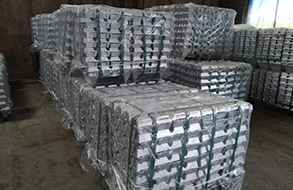Better prospect for zinc die-casing alloy industry in 2019
----Interview with Ma Junhao
General Manager
Changzhou Weize Metal Material Co., Ltd.
- Established in 2009, Changzhou Weize Metal Material Co., Ltd. is specialized in zinc die-casting alloy production, producing various series of national standard zinc alloy including Zamak-3 and Zamak-5. The company owns advanced production equipment and scientific management, and spares no efforts to provide better zinc die-casting alloy products.
- Asian Metal: Hello Mr. Ma, thanks for accepting our interview. Would you please introduce your company and production briefly?
- Mr. Ma: Established in 2009, our company engages in zinc die-casting alloy production and has advanced automatic production line and spectrum analyzer. With an annual capacity of 8,000t for zinc alloy, we maintain stable output of about 600tpm now.
- Asian Metal: Our government still conducts strict environmental inspections on electroplating companies, so can you talk about the impact of environmental inspections on your company and the whole zinc die-casting alloy industry?
- Mr. Ma: Firstly, environmental inspections have little impact on us as we passed EIA in 2017 and have sewage treatment equipment with wastewater and exhaust emission in line with the national standards. Secondly, the environmental inspections in the past few years caused many small substandard companies to shut down successively, which promotes healthy development of the industry.
- Asian Metal: Please briefly tell us the current demand for zinc die-casting alloy and the reasons for that.
- Mr. Ma: March and April regularly are the peak season for zinc die-casting alloy, but the demand is not strong now and less than the same period last year. There are three reasons, I think. Firstly, environmental inspections led to low operating rate in downstream market, resulting in less demand; secondly, zinc ingot prices rose by more than RMB2,000/t (USD292/t) from after the Spring Festival holiday to early April, and zinc die-casting alloy prices followed suit, so high prices restrained downstream purchases; thirdly, China-U.S. trade war resulted in fewer exports.
- Asian Metal: What fields are your products applied to? And how will they develop in 2019 in your opinion?
- Mr. Ma: Our products are mainly used in electronics, bathrooms, sanitary wares, auto parts and some small hardware. I'm bullish about the market outlook in 2019. On the one hand, the economy shows signs of picking up, and the U.S. and China are expected to reach a deal to end the trade war, so downstream consumption would rise to some extent along with better macro-economy; on the other hand, inspired and supported by relative policies, auto and electronics industries are expected to develop better in 2019 compared with 2018.
- Asian Metal: As far as I know, some companies are replacing zinc alloy with aluminum alloy in production. What are the reasons in your opinion? And what are the advantages zinc alloy has compared with aluminum alloy?
- Mr. Ma: It surely happens in the industry as aluminum alloy can be used to produce products with low properties requirement. Aluminum ingot price stands at about RMB14,000/t (USD2,041/t) while that of zinc ingot is about RMB22,000/t (USD3,208/t), leaving aluminum alloy more competitive on price than zinc alloy, so some companies would use aluminum alloy to reduce production cost. However, zinc alloy has significant advantages on hardness, liquidity and conductibility. In addition, zinc alloy can be used in surface treatment including galvanization and painting, so many products like sanitary wares, door handles and electronic components can't be made of aluminum alloy.
- Asian Metal: In your opinion, how do the zinc die-casting alloy companies keep the market competitiveness in the current environment?
- Mr. Ma: The current market witnesses fierce competition, and TCs for zinc alloy are at very low levels in recent years, so producers can only earn thin profit. In my opinion, however, reducing TCs should not be the only way to keep competitiveness, and product quality would finally count. So companies should put more efforts in promoting process technology and enterprise management to ensure product quality and improve customer satisfaction.
- Asian Metal: Could you please share your vision of the zinc die-casting alloy market?
- Mr. Ma: I am optimistic about the zinc die-casting alloy market outlook, especially the auto and electronics industries. Auto production and sales began to drop from 2018, but the demand for zinc alloy from the auto industry is expected to be quite good as China unveiled policies to encourage auto purchases and NEV industry develops rapidly. The electronics industry supports information society development, and the industry is bound to keep high growth in the future. Furthermore, zinc alloy's applications in these fields can't be replaced by aluminum alloy.
- Asian Metal: Would you please share your development goal with us?
- Mr. Ma: We only have one automatic production line now, and plan to add another one this year, so the annual capacity is expected to reach around 15,000t. At the same time, we also plan to diversify our business and set foot in the trade of non-ferrous metals including zinc ingot, aluminum ingot and copper plate in the next five years.


